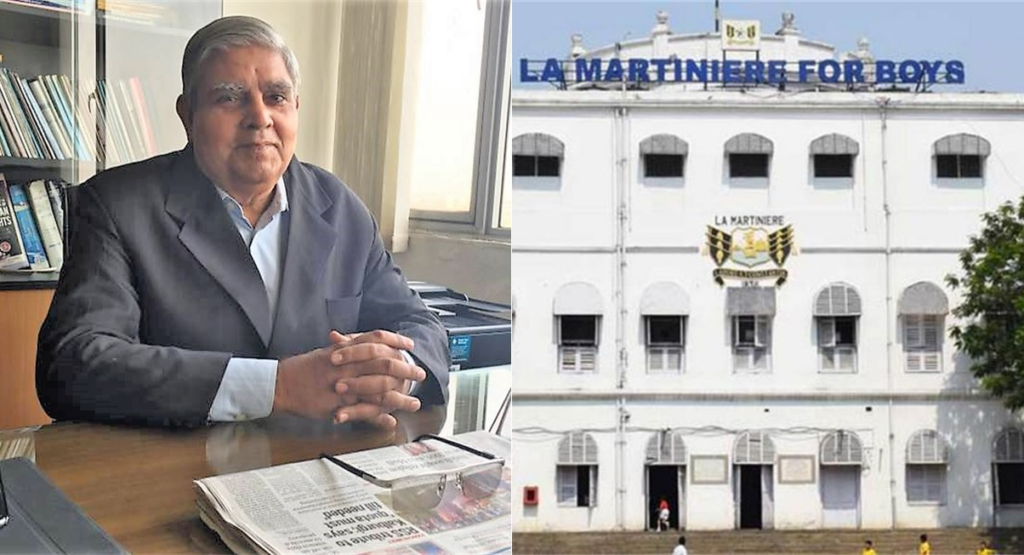The sectarian behaviour of minority institutions has been exposed once again, this time by the Governor of West Bengal Jagdeep Dhankhar. The Governor criticized “La Martiniere School for Boys” for not allowing him to become an ex-officio member of the governing board because he is not “Christian“.
“I am sure in our country it cannot happen. You can be a religious minority school. I have no problem with that. But if you say that a particular governor can be associated only if he is of a particular religion, that directly hits Article 14 of the Constitution (fundamental rights to equality before law). This can’t be countenanced,” said the Governor.
The constitution of school has a provision that a permanent member of the board must be Christian; no person of any other faith is allowed even if s/he is constitutional head of state.
“The constitution of the school provides that all permanent members have to be Christian by faith,” said Supriyo Dhar, secretary of La Martiniere Schools (Boys and Girls).
As per Article 30 of the constitution, minority community (religious and linguistic) has the right to establish and administer educational institutions of their choice.
This had led to the proliferation of Madrasas and Christian educational institutions, but the same right is not conferred upon the majority.
The minority institutions reserve seats for the ‘minority community’, prohibit the members of ‘other faiths’ to enter in the governing council of these institutions and refrain them from exercising any authority.
In many cases, these institutions are funded by the government. But this is a direct violation of Article 14 of the Constitution (fundamental rights to equality before law).
It is well known that many Christian organizations run education and medical trusts, and being a minority institution, they do not pay taxes despite making a lot of money.
These institutions keep reserved seats for people from their communities, and even top colleges such as St Stephens College (funded by Central Government) carry out this practice. Similarly, there are Madrasas and universities run by Muslims, and in their case, the government even provides funds to these institutions.
Therefore, public money is being used for the welfare of a “particular” religious community.
In the start of this academic year, there was a widespread protest against the admission process in the St Stephen’s College, Delhi University, because the Church was allowed to interfere in the interview.
The college principal- John Verghese, announced that the Interview panel will include one member of college’s Supreme Council, which is formed by non-academician and reserved for Christians.
St Stephen’s College is governed by members of Church of North India, and Supreme Council and the Governing Body Chairperson post is automatically presided by Bishop of Delhi. The Member Secretary of Supreme Council and Governing body is the Principal who is a member of the Church of North India and therefore a Christian.
The institutions of minority community get a free hand in management even if they are financially supported by the government. The church is the largest landowner in India, and the majority of the land is controlled illegally, as they have just captured it in the name of community development.
On the other hand, Hindu temples are facing an assault from “secular” state governments all across the country.
These governments, under various Hindu Religious and Charitable Endowments (HRCE), Acts, control Hindu temples and religious institutions, taking advantage of the fact that the Constitution does not protect the rights of the Hindu community as it does in the case of the minorities.
The state governments control the financial resources of the temple, and use it for ‘public welfare’. The ‘minority institutions’ does not allow the members of other faith to become a member of their governing body even if s/he is constitutional head of state while the ‘secular’ governments across the country loot the resources of Hindu institutions.
Hindu religious sites have long been a victim of exploitation by political forces, from the invasion by radical Islamists to current day ‘secular’ governments.
Different state governments have enforced laws through which they have assumed both financial and administrative control of Hindu religious sites. What started as a tool to suppress Indians and keep them under imperial rule by the British, these laws still exist and continue to exploit and degrade Hindu religious shrines.
